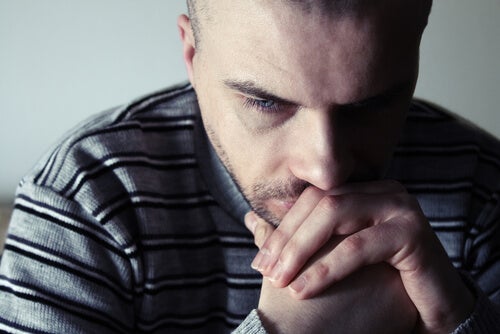Erectile Dysfunction: Symptoms, Causes, and Treatment

Erectile dysfunction is defined as the inability to get and maintain an erection that allows for satisfactory sexual performance. Although it’s not a severe condition, it can affect a patient’s social and personal life, as well as their partner’s. It affects roughly 5 to 20% of men.
There are several risk factors to this condition, such as lack of exercise, heart disease, smoking, hypercholesterolemia, and metabolic syndrome. This, this condition can be prevented by controlling these variables.
Erectile dysfunction symptoms
- Being able to get an erection sometimes but not when the patient wants to engage in intercourse.
- Being able to get an erection but not long enough to complete the sexual encounter.
- Not being able to get an erection at all.

Causes
Erectile dysfunction can be caused by many factors, such as those that affect the circulatory system, the nervous system, and the endocrine system.
The risk of suffering from this condition increases as a person ages. However, age isn’t always the cause. In fact, there are other underlying conditions related to it, such as:
Related medical problems
- Type 2 diabetes.
- Heart and small vessel disease.
- Arteriosclerosis.
- High blood pressure.
- Kidney disease.
- Multiple sclerosis.
- Peyronie’s disease.
- Prostate cancer treatment, including radiotherapy and prostate surgery.
- Penile injuries, as well as spinal cord, prostate, bladder, and pelvic injuries.
- Bladder cancer surgery.
Furthermore, it seems that men who suffer from diabetes are two to three times more prone to developing erectile dysfunction than those who don’t.
Certain medications
Erectile dysfunction can be a side effect of many common drugs, such as:
- Blood pressure medication
- Antiandrogens
- Antidepressants
- Pain killers and sedatives
- Peptic ulcer medications
Psychological or emotional problems
Certain emotional or psychological problems can worsen erectile dysfunction, such as:
- Fear of failing to engage in intercourse.
- Depression and anxiety.
- Guilt related to the patient’s own sexual performance or specific sexual activities.
- Low self-esteem.
- Sexual performance anxiety or general stress.
Certain health-related behaviors and factors
The following health-related factors and behaviors can contribute to erectile dysfunction:
- Smoking.
- Excessive alcohol consumption.
- Use of illegal drugs.
- Being overweight.
- Lack of physical activity.
Erectile dysfunction treatment
Depending on the type of erectile dysfunction, the doctor will recommend a different treatment:
- Psychogenic erectile dysfunction. Psychosexual therapy is usually the best option. Although there are other therapy options, they take a lot of time and don’t guarantee a solution.
- Post-traumatic erectile dysfunction in young patients. The long-term success rate of penile revascularization surgery is about 60 to 70%.
- Hormonal erectile dysfunction. Testosterone replacement therapy (TRT) can be effective but the doctor must first rule out other underlying testicular insufficiency causes that may be related to hormonal imbalances.
The first-line treatment is mainly oral drugs such as selective PDE5 inhibitors. The effectiveness of these drug depends on the patient’s ability to get an erection that can engage in penetration.
Here are a few of these drugs:
- Sildenafil, also known as Viagra.
- Tadalafil, or Cialis.
- Vardenafil, or Levitra.

Alternative treatments
Since all these drugs can cause side effects, it’s important to take the patient’s life and habits into account. But in case the patient isn’t responding well to treatment, other options are available, such as intracavernous injections.
Alprostadil is the only drug for the intracavernous treatment of erectile dysfunction. Usually, erections appear in 5 to 15 minutes, and their duration depends on the injected dose. Another intervention for men who have tried other treatments with poor to no results is penile implant surgery.
Although pharmacological treatment is usually effective, it’s important to make lifestyle changes as well. Many times, the risk factors we mentioned above lead to this problem which negatively impacts many people’s lives.
Erectile dysfunction is defined as the inability to get and maintain an erection that allows for satisfactory sexual performance. Although it’s not a severe condition, it can affect a patient’s social and personal life, as well as their partner’s. It affects roughly 5 to 20% of men.
There are several risk factors to this condition, such as lack of exercise, heart disease, smoking, hypercholesterolemia, and metabolic syndrome. This, this condition can be prevented by controlling these variables.
Erectile dysfunction symptoms
- Being able to get an erection sometimes but not when the patient wants to engage in intercourse.
- Being able to get an erection but not long enough to complete the sexual encounter.
- Not being able to get an erection at all.

Causes
Erectile dysfunction can be caused by many factors, such as those that affect the circulatory system, the nervous system, and the endocrine system.
The risk of suffering from this condition increases as a person ages. However, age isn’t always the cause. In fact, there are other underlying conditions related to it, such as:
Related medical problems
- Type 2 diabetes.
- Heart and small vessel disease.
- Arteriosclerosis.
- High blood pressure.
- Kidney disease.
- Multiple sclerosis.
- Peyronie’s disease.
- Prostate cancer treatment, including radiotherapy and prostate surgery.
- Penile injuries, as well as spinal cord, prostate, bladder, and pelvic injuries.
- Bladder cancer surgery.
Furthermore, it seems that men who suffer from diabetes are two to three times more prone to developing erectile dysfunction than those who don’t.
Certain medications
Erectile dysfunction can be a side effect of many common drugs, such as:
- Blood pressure medication
- Antiandrogens
- Antidepressants
- Pain killers and sedatives
- Peptic ulcer medications
Psychological or emotional problems
Certain emotional or psychological problems can worsen erectile dysfunction, such as:
- Fear of failing to engage in intercourse.
- Depression and anxiety.
- Guilt related to the patient’s own sexual performance or specific sexual activities.
- Low self-esteem.
- Sexual performance anxiety or general stress.
Certain health-related behaviors and factors
The following health-related factors and behaviors can contribute to erectile dysfunction:
- Smoking.
- Excessive alcohol consumption.
- Use of illegal drugs.
- Being overweight.
- Lack of physical activity.
Erectile dysfunction treatment
Depending on the type of erectile dysfunction, the doctor will recommend a different treatment:
- Psychogenic erectile dysfunction. Psychosexual therapy is usually the best option. Although there are other therapy options, they take a lot of time and don’t guarantee a solution.
- Post-traumatic erectile dysfunction in young patients. The long-term success rate of penile revascularization surgery is about 60 to 70%.
- Hormonal erectile dysfunction. Testosterone replacement therapy (TRT) can be effective but the doctor must first rule out other underlying testicular insufficiency causes that may be related to hormonal imbalances.
The first-line treatment is mainly oral drugs such as selective PDE5 inhibitors. The effectiveness of these drug depends on the patient’s ability to get an erection that can engage in penetration.
Here are a few of these drugs:
- Sildenafil, also known as Viagra.
- Tadalafil, or Cialis.
- Vardenafil, or Levitra.

Alternative treatments
Since all these drugs can cause side effects, it’s important to take the patient’s life and habits into account. But in case the patient isn’t responding well to treatment, other options are available, such as intracavernous injections.
Alprostadil is the only drug for the intracavernous treatment of erectile dysfunction. Usually, erections appear in 5 to 15 minutes, and their duration depends on the injected dose. Another intervention for men who have tried other treatments with poor to no results is penile implant surgery.
Although pharmacological treatment is usually effective, it’s important to make lifestyle changes as well. Many times, the risk factors we mentioned above lead to this problem which negatively impacts many people’s lives.
All cited sources were thoroughly reviewed by our team to ensure their quality, reliability, currency, and validity. The bibliography of this article was considered reliable and of academic or scientific accuracy.
-
Wespes, E., Amar, E., Eardley, I., Giuliano, F., Hatzichristou, D., Hatzimouratidis, K., … & Vardi, Y. (2002). DISFUNCIÓN SEXUAL MASCULINA: Disfunción eréctil y eyaculación precoz. Eur Urol, 41(1), 1-5.
- Síntomas y causas de la disfunción eréctil | NIDDK. (2017). Retrieved from https://www.niddk.nih.gov/health-information/informacion-de-la-salud/enfermedades-urologicas/disfuncion-erectil/sintomas-causas
This text is provided for informational purposes only and does not replace consultation with a professional. If in doubt, consult your specialist.







